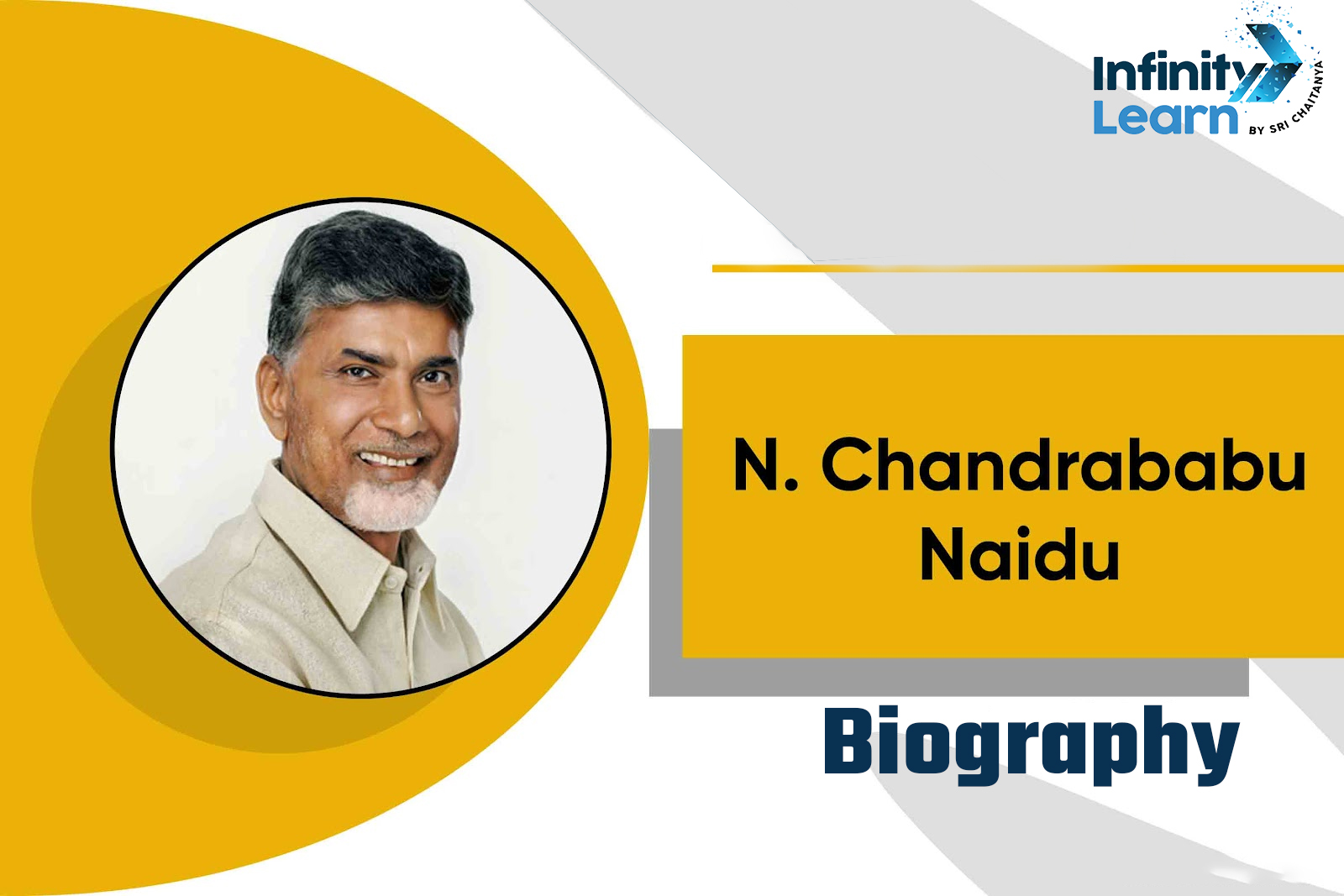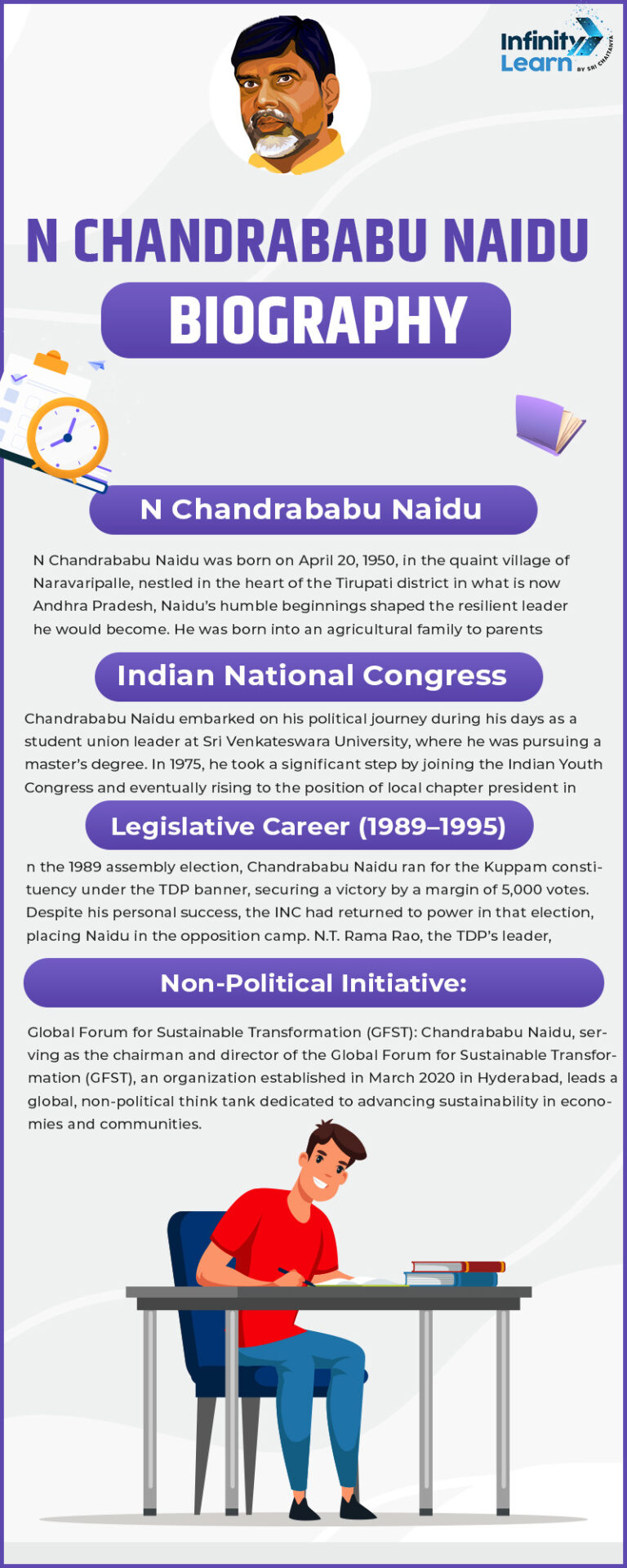Table of Contents
Nara Chandrababu Naidu, popularly known as CBN, is a prominent Indian politician and the current Leader of Opposition in the Andhra Pradesh Legislative Assembly. With a political career spanning decades, Naidu served as the Chief Minister of Andhra Pradesh from 1995 to 2004 and held the position of Opposition Leader from 2004 to 2014. N Chandrababu Naidu is also the National President of the Telugu Desam Party (TDP). However, Naidu faced a significant setback in the 2019 Andhra Pradesh Legislative Assembly Elections, securing only 23 seats out of the total 175, marking the TDP’s worst-ever defeat. Despite this, his political journey continues to be a subject of interest and intrigue in the dynamic landscape of Indian politics.

N Chandrababu Naidu
N Chandrababu Naidu was born on April 20, 1950, in the quaint village of Naravaripalle, nestled in the heart of the Tirupati district in what is now Andhra Pradesh, Naidu’s humble beginnings shaped the resilient leader he would become. He was born into an agricultural family to parents Nara Kharjura Naidu and Amanamma, and he shared his early years with a younger brother, Nara Ramamurthy Naidu, and two younger sisters. Naidu’s journey to education was not without its challenges, as his village lacked a school.
Undeterred, he commenced his academic journey in Seshapuram, attending primary school until the fifth grade. His quest for knowledge led him to the Chandragiri Government High School, where he completed his secondary education up to the tenth grade. Demonstrating unwavering determination, N Chandrababu Naidu earned his B.A. degree in 1972 from Sri Venkateswara Arts College, Tirupati, before pursuing his passion for economics, culminating in a master’s degree from Sri Venkateswara University.
While his academic pursuits were impressive, his ambition to complete a Ph.D. on the Economic ideas of Professor N. G. Ranga under the guidance of Professor Dr. D. L. Narayana was left unfinished, a testament to the winding path of life that eventually led him to a distinguished political career. Naidu’s journey is further defined by his battle with vitiligo, an autoimmune condition that causes white patches on the skin, underscoring his resilience in the face of adversity.
N Chandrababu Naidu Political Career
Indian National Congress
Chandrababu Naidu embarked on his political journey during his days as a student union leader at Sri Venkateswara University, where he was pursuing a master’s degree. In 1975, he took a significant step by joining the Indian Youth Congress and eventually rising to the position of local chapter president in Pulicherla. His political inclinations shifted towards supporting Sanjay Gandhi during the Emergency imposed on the nation in 1975.
With the backing of N. G. Ranga, Naidu secured a coveted candidacy from the Congress party through its 20% youth quota, leading to his election as a Member of the Legislative Assembly (MLA) for the Chandragiri constituency in the 1978 assembly elections. Early in his political career, he served as a director of the Andhra Pradesh Small Scale Industries Development Corporation. His journey continued as he was appointed as a minister in T. Anjaiah’s government. During his tenure from 1980 to 1983, Naidu held diverse portfolios, including archives, cinematography, technical education, and minor irrigation within the state government. Remarkably, he became the youngest MLA at the age of 28 and a minister at the age of 30 in Andhra Pradesh at that time.
Notably, while serving as the cinematography minister, Naidu crossed paths with the iconic Telugu film star N. T. Rama Rao. This encounter led to his marriage to Bhuvaneswari, Rama Rao’s second daughter, in September 1981.
Legislative Career (1989–1995)
In the 1989 assembly election, Chandrababu Naidu ran for the Kuppam constituency under the TDP banner, securing a victory by a margin of 5,000 votes. Despite his personal success, the INC had returned to power in that election, placing Naidu in the opposition camp. N.T. Rama Rao, the TDP’s leader, appointed him as the coordinator of the party, and in this role, Naidu effectively managed the TDP’s responsibilities as the primary opposition in the assembly. His exceptional performance garnered widespread acclaim from both the party’s members and the general public. Naidu’s pivotal role, both within the Legislative Assembly and beyond its walls, played a crucial part in the subsequent triumph of the party.
N Chandrababu Naidu’s Impact on National Politics (1996-2004)
- Leadership in the United Front (1996-1998): Chandrababu Naidu assumed the crucial position of convenor for the United Front, a coalition consisting of 13 diverse political parties. This alliance achieved power at the center following the 1996 parliamentary elections, with H.D. Deve Gowda and later I.K. Gujral serving as Prime Ministers. The United Front established its headquarters at Andhra Pradesh Bhavan in New Delhi.
- The 1999 Lok Sabha Elections: Naidu’s significance in national politics grew after the 1999 Lok Sabha elections. The Telugu Desam Party (TDP) and the Bharatiya Janata Party (BJP), who had a pre-poll understanding in Andhra Pradesh, emerged victorious, winning a remarkable 36 out of 42 parliamentary seats in the state. Notably, the BJP became the largest single party in the Lok Sabha. In a strategic move, the TDP, led by Naidu, extended the support of 29 of its MPs to the National Democratic Alliance (NDA) government under A.B. Vajpayee.
- Unique Approach to Governance: Naidu’s approach was distinctive as the TDP chose not to join the government but instead offered “issue-based support.” While Vajpayee had proposed eight cabinet positions for the TDP, Naidu’s party decided to stay out of the union cabinet and provided external support to the NDA government.
Chandrababu Naidu’s journey in national politics during this period was marked by strategic alliances and a distinctive approach to governance, which left a lasting impact on the Indian political landscape.
N Chandrababu Naidu Business Career:
Heritage Foods Limited (HFL) is a renowned dairy enterprise that was established by Naidu in 1992. In 1994, the company successfully went public, and since then, it has become a significant player in the Indian dairy industry. In the financial year 2021–22, Heritage Foods achieved an impressive annual turnover of INR 26,429 million. Presently, Nara Bhuvaneswari, who is Naidu’s wife, holds the prestigious position of Vice-Chairperson & Managing Director, while Nara Brahmani, Naidu’s daughter-in-law, serves as the Executive Director.
Heritage Foods boasts an extensive network of outlets spread across Andhra Pradesh, Telangana, and numerous other states in India, catering to a wide customer base. Additionally, the company has made strides in the renewable energy sector, operating captive solar and wind power plants across 11 different locations. Notably, HFL constitutes a substantial portion of Naidu’s current assets.
N Chandrababu Naidu Non-Political Initiative:
- Global Forum for Sustainable Transformation (GFST): Chandrababu Naidu, serving as the chairman and director of the Global Forum for Sustainable Transformation (GFST), an organization established in March 2020 in Hyderabad, leads a global, non-political think tank dedicated to advancing sustainability in economies and communities.
In June 2023, GFST hosted a seminar in Hyderabad focusing on ‘Deep Technologies.‘ Notable among its endeavors is the development of Vision India@2047, aligning with India’s centennial year of Independence. On the 15th of August 2023, in Visakhapatnam, Naidu unveiled a vision document titled India@2047, authored by GFST, which outlines their commitment to sustainable transformation.
- NTR Trust: The NTR Memorial Trust, established in 1997 by Chandrababu Naidu, is a prominent non-profit organization committed to diverse community initiatives. These include providing free education, operating vital blood transfusion facilities, conducting health camps, and supporting empowerment and livelihood programs.
The Trust efficiently manages a state-of-the-art blood bank and Thalassemia centre in Hyderabad, in addition to well-equipped blood banks in Visakhapatnam and Tirupati. Furthermore, the Trust plays a pivotal role in education, overseeing schools in Hyderabad and Challapalli (Krishna district), as well as the renowned NTR Junior & Degree College for Women in Hyderabad. Nara Bhuvaneswari, the wife of Chandrababu Naidu, serves as the dedicated managing trustee, ensuring the Trust’s day-to-day operations are conducted with excellence and compassion.
- Chandrababu Naidu, a prominent Chief Minister, made waves during his remarkable nine-and-a-half-year tenure from 1995 to 2004. Often hailed as the ‘high-tech Chief Minister,’ he championed state-level liberalization policies, earning global recognition. Western media lauded him as one of the most promising leaders, not only in India but also in the developing world. Naidu’s strategic leadership led Andhra Pradesh to secure a direct World Bank loan, making it the pioneer Indian state in economic restructuring. Naidu’s international influence was undeniable, with regular appearances at World Economic Forum meetings in Davos, Switzerland.
His meetings with Bill Gates, Microsoft’s chairman, and the subsequent visit by Gates to Hyderabad, alongside the 2000 visit of US President Bill Clinton, significantly bolstered his reputation. His credit extends to driving the information technology sector and modernising Hyderabad, including the development of an international airport and the prestigious Indian School of Business (ISB). During his third term from 2014 to 2019, Naidu embarked on an ambitious endeavour to construct the capital city of Amaravati for the bifurcated state. This period also marked Andhra Pradesh’s ascent to the top spot in the Ease of Doing Business (EoDB) Rankings.
N Chandrababu Naidu Biography Summary

FAQs on N Chandrababu Naidu Biography
Who is N. Chandrababu Naidu?
N. Chandrababu Naidu, also known as CBN, is a well-known Indian politician. He has served as the Chief Minister of Andhra Pradesh and is currently the Leader of Opposition in the Andhra Pradesh Legislative Assembly.
Where was N. Chandrababu Naidu born?
N. Chandrababu Naidu was born in Naravaripalle, a village in the Tirupati district of Andhra Pradesh, India.
What was N. Chandrababu Naidu's educational background?
He completed his B.A. degree from Sri Venkateswara Arts College, Tirupati, and pursued a master's degree in economics from Sri Venkateswara University. However, he did not finish his Ph.D
When did N. Chandrababu Naidu begin his political career?
N. Chandrababu Naidu's political journey started in the 1970s when he joined the Indian Youth Congress and became a Member of the Legislative Assembly (MLA) in 1978.
What significant roles did N. Chandrababu Naidu play in national politics?
Naidu served as the convenor of the United Front, a coalition of political parties, and played a vital role in the 1999 Lok Sabha elections. His party's support to the National Democratic Alliance (NDA) under A.B. Vajpayee was instrumental.








